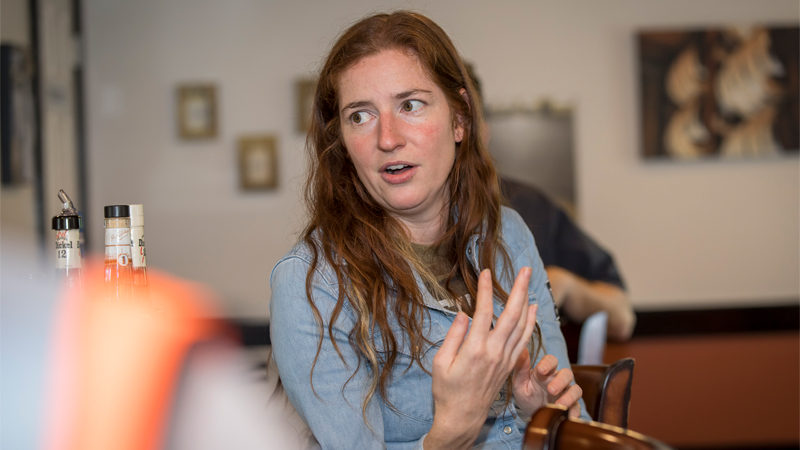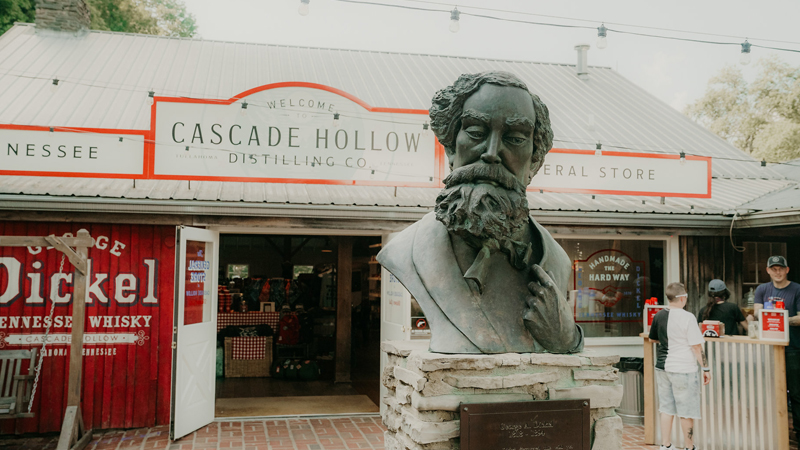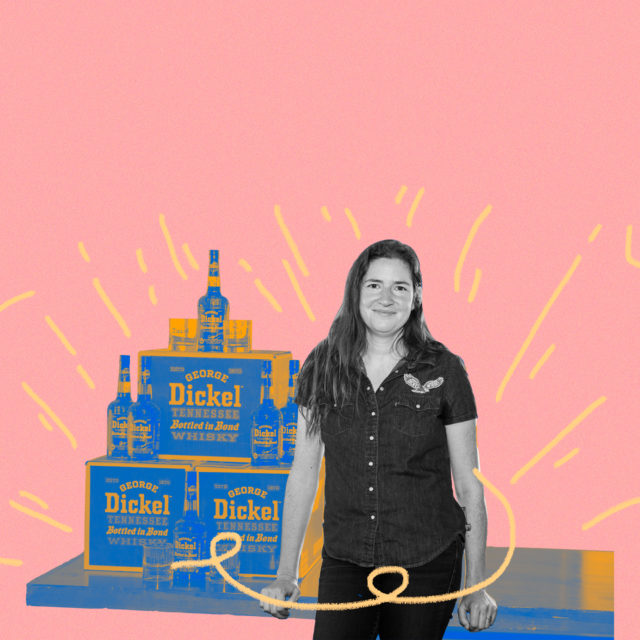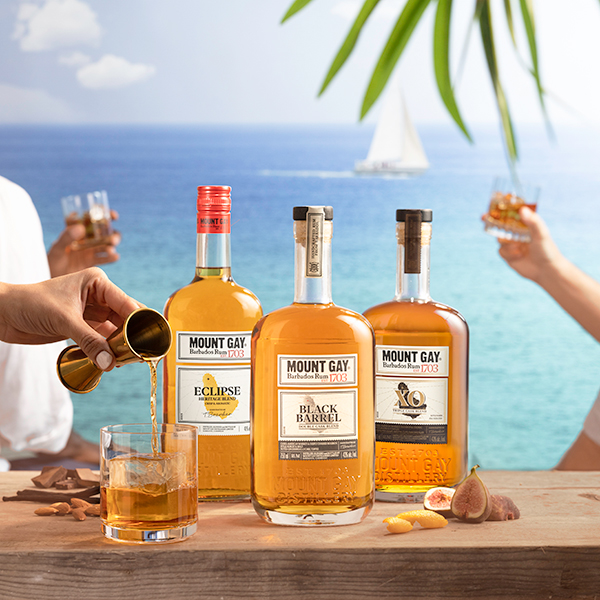Let’s cut right to the chase. By all accounts, Nicole Austin is one of the biggest badasses in American distilling today. She’s broken new ground at every career turn — from her early days bucking industry trends at Kings County Distillery, to her adventures co-founding two craft distilling trade organizations, to winning accolades for her first release as general manager and distiller at Cascade Hollow. Now, with the muscle of Diageo behind her and a vision for putting Tennessee whiskey back on the bourbon map, Austin is hitting new strides.
“One of the things that blows my mind about Nicole’s journey is how almost perfectly her narrative reads like a tale,” says Christopher Williams, the chief distiller and blender at Coppersea in New Paltz, N.Y. “You look at it, and it almost seems like, well, naturally that was the only thing that ever could’ve happened as a result of that story.”
After earning her bachelor’s degree in chemical engineering from Manhattan College in Riverdale, N.Y., in 2006, Austin started off her career in environmental engineering. “I thought I was going to be the next Erin Brockovich. That was 100 percent my plan,” says Austin. “I was going to takedown evil polluters and look great in miniskirts while I did it.” It turned out that working on massive waste management infrastructure and scaled engineering projects didn’t afford her much time to find and expose polluters.
When she switched gears and moved into distilling, it was practically on a lark. Out at a bar, on a date, the bartender poured her a whiskey and started talking about how it was made. Austin became so enthralled she completely ignored her date and listened to the bartender talk about whiskey for the rest of the night. Learning about distilling was a sea change. “Suddenly,” she says, “it was completely obvious that was what I was meant to do.”
She has been blazing trails ever since.
Breaking New Ground
In 2011 at 27 years old, about a year after landing her first job in the spirits industry as Kings County Distillery’s master blender, Austin distilled a rye whiskey that later won Double Gold at the 2015 San Francisco World Spirits Competition.
“It’s rare as a distiller that you actually get to touch every part of the process,” she says. “But the first time Kings County made rye, I actually touched every part of the process.” She underscores that this was at a time when critics were questioning whether craft producers were even making anything of value and some were “really poo-pooing the use of small barrels.”
John Jeffery, Master Distiller of Bentley Heritage in Minden, Nev., and cofounder of the Good Guys, a private industry Facebook group of about 100 craft distillers, says Austin was one of first people to prove that craft distillers could put out high-quality products. “She was really a steward of quality, which I think was super important.”
From Kings County, Austin went on to work as a consultant with the legendary Dave Pickerell, which, she says, was like doing a crash course in American craft distilling. In 2016, she took a job with William Grant & Sons as the commissioning engineer at Tullamore D.E.W. in Ireland, her first industrial-scale distillery. That was when she finally truly felt successful, which, in her mind, meant she could stop worrying about paying her rent.

Helping to Shape the American Whiskey Industry
In addition to ascending in her own career, Austin has devoted herself to raising others up within the spirits community. She helped found the New York State Distillers Guild with Coppersea’s Williams and Brian McKenzie of Finger Lakes Distilling, and was president of the regional trade organization from 2012 through 2015. She was also a founding board member of the American Craft Spirits Association (ACSA) and remains an affiliate member.
“Rarely have I seen someone who commits as much time and energy to promoting the industry as she does,” says Jeffery. “She convinced us that trade organizations were a way to band together and fight for the industry — that it was really the way to raise all the boats.”
Williams, who also worked with Austin on the legislative effort to establish Empire Rye as a New York State regional style, adds that Austin is a hugely collaborative person and the initiatives they worked on were designed to bring the state’s distillers together and elevate the whole lot. “We saw early on that just one of us out there is drifting in the sea, but if we’re all together, we’re an armada and can’t be ignored.”
And while her efforts to mobilize the distilling industry at the state and national levels is impressive, John McKee, the owner of Headframe Spirits in Butte, Mont., and the other cofounder of the Good Guys, says that hands-down, the most impactful thing Austin has done so far for craft distilling is to help get the federal excise tax (FET) reduced as part of the Craft Beverage Modernization and Tax Reform Act. “How many hundreds of millions of dollars has her work saved the entire industry on the FET?” he asks.
“I’m always surprised that so few people understand how directly impactful she and Mark Shilling were in getting that thing through,” says McKee. He laughs, imagining Austin mulling over what would benefit the industry most: Driving corn prices down? Finding cheaper bottle suppliers? “She was like, no, ‘let’s get the FET carved by a fifth.’ I mean, holy crap, that level of [thinking] — it has nothing to do with mashing and distilling, or selecting barrels.” It’s the sign of a true well-rounded master distiller who understands that it’s about more than just the juice in the bottle, he says. He brings up the tattoo on Austin’s arm — the bill number for the FET reduction. “It’s just not said enough, and I can’t imagine a larger impact nationwide that anyone in the industry could really claim.”
Each year McKee and Jeffery anoint a distiller — albeit in a tongue-and-cheek way — as King of the Good Guys, a group expressly created so distillers could share information and help each other out. Last year, after whiskey that was made during Austin’s watch at Kings County won best-in-class gold at the ACSA Awards, they crowned her the group’s queen.
When she took her new role with Diageo, Austin was afraid she’d no longer be embraced by the craft side of the industry, so being named Queen of the Good Guys was momentous. “It’s just a silly thing,” says Austin. “Like, I got thrown in a pool by the previous king, but at the same time it was also really meaningful to me.”
The insider honor just goes to show that she’s exactly the kind of unicorn distiller that can keep one foot firmly planted in the craft camp even while the other is charting new territory on the commercial side with the world’s largest alcohol producer.
Austin even asked McKee how they were going to make her Queen of the Good Guys if she wasn’t “‘a craft gal anymore.’ And the whole answer to that,” he says, “was that she really still is.”
“She’s our queen,” says Jeffery, “because she’s a badass. She’s perfect for it. ”
Forging Ahead in a New Chapter
In March 2018, Austin relocated from Tullamore, Ireland to Tullahoma, Tenn., to take over operations at Cascade Hollow, where her responsibilities would span both the distillation-production side and the brand-sales side. “It’s really about one person holding accountability across the entire Cascade Hollow Distilling Company and caring about every detail,” she says.
Her first innovation at Cascade Hollow, George Dickel Bottled in Bond, a 13-year-old Tennessee whiskey, won both Whiskey of the Year from Whisky Advocate and “Best Buy” in Wine Enthusiast’s Top 100 Spirits of 2019.
“That was beyond my wildest dreams,” she says. “When blending that whiskey, I specifically set out with the goal of trying to make the point that Cascade Hollow belongs in the pantheon of American greats — that we’re among the best whiskey producers in the U.S., and that we have an authentic claim to that heritage. For that to happen, it was like hitting a grand slam at the World Series your first year in the majors.”
Steve Rust, the president of reserve and new business commercialization at Diageo, says it’s telling. “We’re thrilled Nicole’s efforts and contributions to the industry were quickly recognized through the Whisky of the Year award,” he says. “This recognition is a great honor for Nicole and George Dickel, but also shines an important light on Tennessee whisky, reminding consumers of the exceptional offerings available within the category.”
Coppersea’s Williams also points out that what Austin is doing at Dickel is bringing craft thinking into the larger context of industrial distilling. “That decision to do bottled-in-bond,” he says, “is directly correlated with her ethos in craft distilling.”

Innovating in Tennessee
So what is Tennessee whiskey — and what does Austin want you to know about it?
“It’s bourbon!” she exclaims. “Boy, if I could shout that far and wide.” It’s an original style of bourbon filtered through a maple charcoal mellowing process that “let’s distillers reach for big, bold, complex fruit flavors.” She laments that “this big bourbon boom happened and no one looked at Tennessee.” But she’s going to change that.
These days, Austin thinks about innovation in two different ways. “Now that I’m working with a brand like George Dickel that has 150 years of history, I think about what kind of things I can do that’ll bring respect to it. That’s what Bottled in Bond was all about.” On the flipside, resurrecting the historic Cascade Hollow Distilling Company name was done precisely so that Austin would have the freedom to experiment. She’s excited to be tapping into the creative thinking processes she used when she was distilling craft spirits, and asking, “What completely new and weird different thing can I do here that has nothing to do with George Dickel?”
This sentiment is echoed by Nic Smieszek, Cascade Hollow’s special projects lead. Working with Austin has taught him about the importance of understanding the history of a whiskey and how to remain loyal to it while seeking opportunities for innovation. “And those opportunities,” he says, “are how crazy can we go, how off the wall? It’s a cross between staying true to who [we] are and learning how to take our whiskey to the next level.”
Smieszek has also collaborated with Austin on launching an internship program that brings bartenders and other industry professionals into the distillery for a full day of hands-on work where they learn about the distilling process by actually doing it. So far they’ve had about 60 people from the mid-Tennessee area participate, and they’re hoping to eventually open the program up to invite others from across the country.
“It’s been really cool,” says Smieszek, “to put this together and see how it’s turning people that liked George Dickel before into these self-proclaimed brand enthusiast spokespeople who are running around Nashville saying, ‘Have you been to George Dickel? Have you met Nicole Austin?’”
What’s Ahead?
Community, collaboration and sustainability are top of mind for Austin. She spends a lot of time thinking about how she can showcase local farmers, suppliers, and distillers. “To me,” she says, “trying to source well has been a really big part of ethics and sustainability.”
She’s also taking Dickel’s existing production methods and implementing more eco-friendly operations. “We’ve got a lot of pretty aggressive sustainability initiatives,” she says. She’s evaluating materials and space, changing up the maturation process and starting to use some smaller barrels. She’s also thinking strategically about water usage and — not surprisingly — waste management.
The biggest news on the horizon is Austin’s Liquid Innovations project, which involves everything from new mash bills and yeasts to new spirits. She’s experimenting with a range of fermentation, distillation, and production methods, with not using maple charcoal mellowing, and with using it on different spirits to see what it brings to them. She’s also very interested in exploring what Cascade Hollow might be capable of producing besides Tennessee whiskey.
In addition, Austin has a number of small-scale experiments in the works, driven mainly by things she loves like apples and white whiskey. (She knows she’s out on a limb with the latter.) There may be some upcoming collaborations with brewers and other producers, too.
“It’s pretty exciting to have so much whiskey to work with,” says Austin. “Never in my years as a craft producer have I ever had that experience, with thousands and thousands and thousands of barrels that were all mine to do what I wanted with them. I’m like a kid in a candy store.”
This story is a part of VP Pro, our free content platform and newsletter for the drinks industry, covering wine, beer, and liquor — and beyond. Sign up for VP Pro now!

